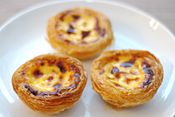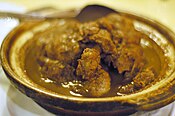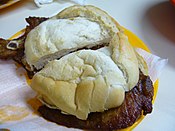Macanese cuisine: Difference between revisions
No edit summary |
Marked this version for translation |
||
| Line 1: | Line 1: | ||
<languages /> | <languages /> | ||
<translate> | <translate> | ||
<!--T:1--> | |||
{{Short description|Culinary traditions of Macanese people}} | {{Short description|Culinary traditions of Macanese people}} | ||
{{Culture of Macau}} | {{Culture of Macau}} | ||
| Line 13: | Line 14: | ||
'''Macanese cuisine''' ({{lang-zh|澳門土生葡菜}}, {{langx|pt|culinária macaense}}) is mainly influenced by [[Chinese cuisine]], especially [[Cantonese cuisine]] and [[European cuisine]], predominantly [[Portuguese cuisine]] and influences from [[Southeast Asia]] and the Lusophone world, due to Macau's past as a Portuguese colony and long history of being an international tourist gambling centre. | '''Macanese cuisine''' ({{lang-zh|澳門土生葡菜}}, {{langx|pt|culinária macaense}}) is mainly influenced by [[Chinese cuisine]], especially [[Cantonese cuisine]] and [[European cuisine]], predominantly [[Portuguese cuisine]] and influences from [[Southeast Asia]] and the Lusophone world, due to Macau's past as a Portuguese colony and long history of being an international tourist gambling centre. | ||
<!--T:2--> | |||
It is an early example of a fusion cuisine and dates to the 16th century. | It is an early example of a fusion cuisine and dates to the 16th century. | ||
<!--T:3--> | |||
== Dishes == | == Dishes == | ||
''Minchi'', [[egg tart]]s, pork chop buns, ginger milk and almond cakes are some of the region's most common delicacies. Common cooking methods make use of various spices such as [[turmeric]], [[coconut milk]], and [[cinnamon]] to give dishes an extra kick of aroma and enhancement of taste. Many routinely consumed dishes in Macau belong to a subclass ([[Heungshan]]) of Cantonese cuisine. Many Macanese dishes resulted from the spice blends that the wives of Portuguese sailors used in an attempt to replicate European dishes with local Chinese ingredients and seasonings. | ''Minchi'', [[egg tart]]s, pork chop buns, ginger milk and almond cakes are some of the region's most common delicacies. Common cooking methods make use of various spices such as [[turmeric]], [[coconut milk]], and [[cinnamon]] to give dishes an extra kick of aroma and enhancement of taste. Many routinely consumed dishes in Macau belong to a subclass ([[Heungshan]]) of Cantonese cuisine. Many Macanese dishes resulted from the spice blends that the wives of Portuguese sailors used in an attempt to replicate European dishes with local Chinese ingredients and seasonings. | ||
<!--T:4--> | |||
Typically, Macanese food is seasoned with various spices including [[turmeric]], [[coconut milk]], and [[cinnamon]], and dried cod (''[[bacalhau]]''), giving special aromas and tastes. Popular dishes include ''[[galinha à Portuguesa]]'', ''[[galinha à Africana]]'' (African chicken), ''[[bacalhau]]'' (traditional Portuguese salt cod), ''[[Cabidela|pato de cabidela]]'', Macanese chili shrimps, ''[[Minchee|minchi]]'', stir-fried curry crab; pig's ear and papaya salad, and rabbit stewed in wine, cinnamon and star anise. | Typically, Macanese food is seasoned with various spices including [[turmeric]], [[coconut milk]], and [[cinnamon]], and dried cod (''[[bacalhau]]''), giving special aromas and tastes. Popular dishes include ''[[galinha à Portuguesa]]'', ''[[galinha à Africana]]'' (African chicken), ''[[bacalhau]]'' (traditional Portuguese salt cod), ''[[Cabidela|pato de cabidela]]'', Macanese chili shrimps, ''[[Minchee|minchi]]'', stir-fried curry crab; pig's ear and papaya salad, and rabbit stewed in wine, cinnamon and star anise. | ||
<!--T:5--> | |||
== Cha Gordo == | == Cha Gordo == | ||
''[[Cha Gordo]]'' (literally "Fat Tea") is a culinary tradition amongst the [[Macanese people|Macanese]] community in [[Macau]] that is likened to [[afternoon tea]]. Historically, families with Portuguese heritage in Macau would host a ''Cha Gordo'' for a number of occasions, including [[Catholic Church|Catholic]] holidays, [[Infant baptism|christening]], or birthdays, but they can be held for any reason. Historically, some families would even host one on a weekly basis. A ''Cha Gordo'' would take place following a Macanese [[wedding]], instead of the elaborate [[banquet]] seen in Chinese weddings. | ''[[Cha Gordo]]'' (literally "Fat Tea") is a culinary tradition amongst the [[Macanese people|Macanese]] community in [[Macau]] that is likened to [[afternoon tea]]. Historically, families with Portuguese heritage in Macau would host a ''Cha Gordo'' for a number of occasions, including [[Catholic Church|Catholic]] holidays, [[Infant baptism|christening]], or birthdays, but they can be held for any reason. Historically, some families would even host one on a weekly basis. A ''Cha Gordo'' would take place following a Macanese [[wedding]], instead of the elaborate [[banquet]] seen in Chinese weddings. | ||
<!--T:6--> | |||
==Macanese dishes and desserts== | ==Macanese dishes and desserts== | ||
{{center|{{Gallery | {{center|{{Gallery | ||
| Line 33: | Line 39: | ||
}}}} | }}}} | ||
<!--T:7--> | |||
==Non-Macanese Macau snacks== | ==Non-Macanese Macau snacks== | ||
{{center|{{Gallery | {{center|{{Gallery | ||
| Line 41: | Line 48: | ||
}}}} | }}}} | ||
<!--T:8--> | |||
==See also== | ==See also== | ||
* [[Cantonese cuisine]] | * [[Cantonese cuisine]] | ||
| Line 47: | Line 55: | ||
* [[List of Chinese dishes]] | * [[List of Chinese dishes]] | ||
<!--T:9--> | |||
==Select bibliography== | ==Select bibliography== | ||
{{Refbegin}} | {{Refbegin}} | ||
| Line 55: | Line 64: | ||
<!--T:10--> | |||
{{Macanese cuisine}} | {{Macanese cuisine}} | ||
{{Cantonese cuisine}} | {{Cantonese cuisine}} | ||
| Line 61: | Line 71: | ||
{{Portal bar|Food}} | {{Portal bar|Food}} | ||
<!--T:11--> | |||
{{DEFAULTSORT:Macanese Cuisine}} | {{DEFAULTSORT:Macanese Cuisine}} | ||
[[Category:Macanese cuisine| ]] | [[Category:Macanese cuisine| ]] | ||
Latest revision as of 14:35, 16 June 2025
| Culture of Macau |
|---|
 |
| History |
| Cuisine |
| Macanese cuisine | |||||||||||
|---|---|---|---|---|---|---|---|---|---|---|---|
| Chinese name | |||||||||||
| Traditional Chinese | 澳門土生葡菜 | ||||||||||
| Simplified Chinese | 澳门土生葡菜 | ||||||||||
| |||||||||||
| Portuguese name | |||||||||||
| Portuguese | Culinária macaense | ||||||||||
Macanese cuisine (Chinese: 澳門土生葡菜, Portuguese: culinária macaense) is mainly influenced by Chinese cuisine, especially Cantonese cuisine and European cuisine, predominantly Portuguese cuisine and influences from Southeast Asia and the Lusophone world, due to Macau's past as a Portuguese colony and long history of being an international tourist gambling centre.
It is an early example of a fusion cuisine and dates to the 16th century.
Dishes
Minchi, egg tarts, pork chop buns, ginger milk and almond cakes are some of the region's most common delicacies. Common cooking methods make use of various spices such as turmeric, coconut milk, and cinnamon to give dishes an extra kick of aroma and enhancement of taste. Many routinely consumed dishes in Macau belong to a subclass (Heungshan) of Cantonese cuisine. Many Macanese dishes resulted from the spice blends that the wives of Portuguese sailors used in an attempt to replicate European dishes with local Chinese ingredients and seasonings.
Typically, Macanese food is seasoned with various spices including turmeric, coconut milk, and cinnamon, and dried cod (bacalhau), giving special aromas and tastes. Popular dishes include galinha à Portuguesa, galinha à Africana (African chicken), bacalhau (traditional Portuguese salt cod), pato de cabidela, Macanese chili shrimps, minchi, stir-fried curry crab; pig's ear and papaya salad, and rabbit stewed in wine, cinnamon and star anise.
Cha Gordo
Cha Gordo (literally "Fat Tea") is a culinary tradition amongst the Macanese community in Macau that is likened to afternoon tea. Historically, families with Portuguese heritage in Macau would host a Cha Gordo for a number of occasions, including Catholic holidays, christening, or birthdays, but they can be held for any reason. Historically, some families would even host one on a weekly basis. A Cha Gordo would take place following a Macanese wedding, instead of the elaborate banquet seen in Chinese weddings.
Macanese dishes and desserts
-
Galinha à Africana
-
Galinha à Portuguesa
-
Pastéis de nata
-
Pato de cabidela
Non-Macanese Macau snacks
-
Pork chop bun
-
Apricot kernel biscuit
-
The Macau ginger milk curd resembles this Hong Kong ginger milk curd.
See also
Select bibliography
- Ferreira Lamas, João António (1995). A culinária dos macaenses. Oporto: Lello & Irmão.
- Gomes, Maria Margarida (1984). A cozinha macaense. Macau: Imprensa Nacional.
- Senna, Maria Celestina de Mello e (1998). Cozinha de Macau. Lisbon: Vega ISBN 972-699-575-2
| この記事は、クリエイティブ・コモンズ・表示・継承ライセンス3.0のもとで公表されたウィキペディアの項目Macanese cuisine(5 May 2025, at 04:09編集記事参照)を素材として二次利用しています。 Item:Q22455 |







